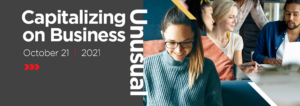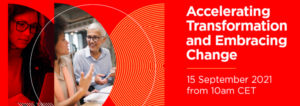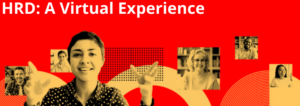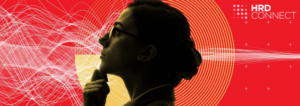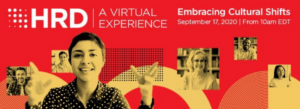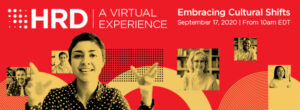HRD: A Virtual Experience - 5 things we learned
- 10 Min Read
Didn’t catch HRD: A Virtual Experience on June 18th? Enjoy our five key takeaways from a day of incredible insights, featuring Terence Mauri, Arianna Huffington, Rita McGrath, Cristina Wilbur and Trish McFarlane.
- Author: HRD Connect
- Date published: Jun 19, 2020
- Categories
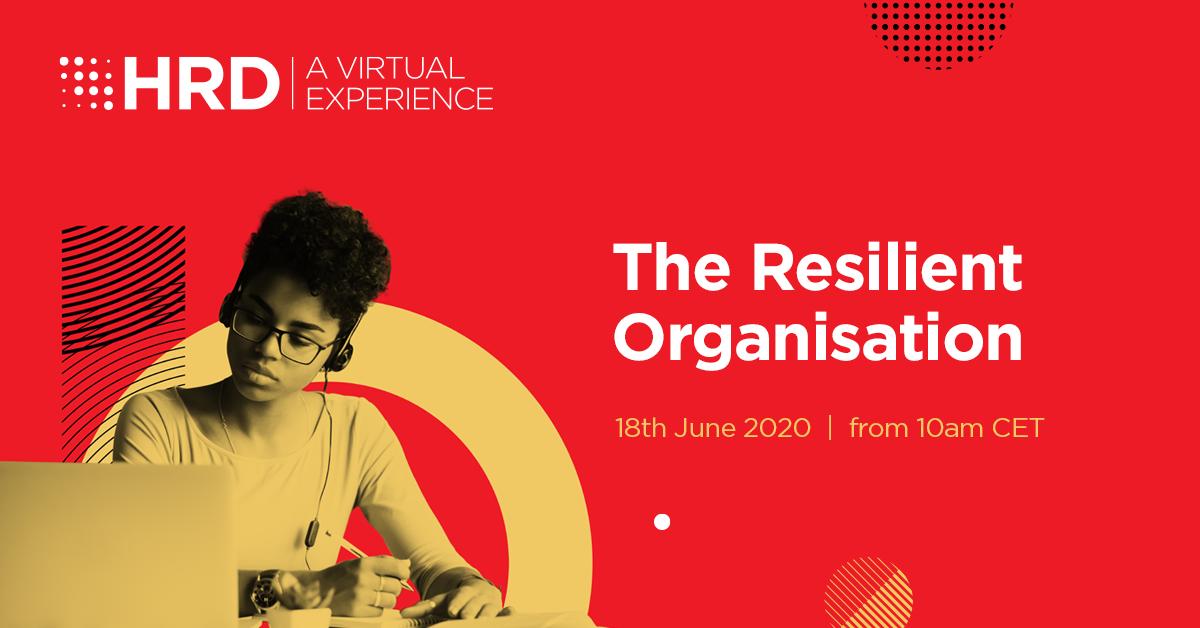
On Thursday June 18, 2500 senior HR leaders from across the globe came together for a landmark virtual event: HRD: A Virtual Experience.
This occasion brought together a host of world leaders in HR and business transformation to dissect and discuss how HR can harness the unprecedented disruption of 2020 to create the resilient organization of the future.
There was a huge array of insights across Keynote Sessions, Masterclasses, Lightning Talks and Roundtables – enough to have any HR leader’s mind racing through lockdown and beyond.
If you weren’t lucky enough to be there, or feel like a debrief, you’re in luck: we’ve put together the five key things we learned from HRD: A Virtual Experience, to help you digest a unique array of incredible insights.
1. 2020 is not cancelled
The keynotes kicked off with the hugely influential Terence Mauri, a global leadership expert and contributor to Forbes, The Economist and HBR, described by Thinkers50 as “an influential and outspoken expert on the future of leadership”.
“What a wonderful opportunity,” Mauri began. “And a great platform to think differently and harness serendipity.”
Mauri focused his session on the central importance of mindset in making the global pandemic an opportunity for greater growth.
While the global pandemic has turned world upside, Mauri told the audience, it has also forced us to rethink how and why we work.
“I propose a ‘brave new world’,” said Mauri. “I don’t believe 2020 needs to be cancelled.”
Rather than a year to write-off, Mauri argued that 2020 is “a year to unshackle from old mindsets” and “a year to thrive”, wherein a “human-led, tech-enabled” future is within our reach.
“What will the future look like?” he asked the audience. “How do you fight complexity with simplicity?”
Describing this brave new world, Mauri shared a recent experience of his, in which he mistook an AI assistant for a real human being, so convincing was the tone of its emails. Mauri revealed that some professionals who conversed with Amy Ingram (AI) even send her flowers!
“My reaction to this was wonder,” said Mauri. “This is not just the age of disruption, this is the age of wonder.”
“Have the courage and resilience to get started,” he said. “Now is not the time for status quo; it’s time for action.”
Mauri concluded his opening keynote with a quotation from Marie Curie – “In life nothing is to be feared, only to be understood. Now is the time to understand more, so that we may fear less.”
2. Agility in tough times is anchored in stability
Cristina Wilbur, Chief People Officer, Roche, invigorated the HRD audience with her session on ‘Creating Personal and Organizational Energy’ – something that we all need now more than ever.
Wilbur began by sharing a background to 125 years of the stunning success of the Roche Group as global innovators in science, healthcare, collaboration and sustainability.
“It could be quite easy to keep doing things the way we’ve been doing things,” said Wilbur, prefacing how Roche has enabled a mindset of constant agility in its organization.
“Agility at Roche is anchored in stability,” she said . “Made of three optimally-balanced key capabilities: speed, stability, and flexibility. Stability is crucial to the importance of long-term purpose, vision and strategy.”
While Wilbur conceded that this framework looks simple, she reiterated that, “It is incredibly difficult to implement and deeply weave into [the] fabric of a company.”
How have Roche managed to use stability as a source of agility?
“We think of organizations not as machines, but as organisms,” she said.
Wilbur encouraged the audience not to think hierarchically, but instead transform their organizations into organisms, built on trust and a network of empowered teams.
“The key to enabling this is a creative mindset,” she said. “A creative mindset unleashes energy and ability, requiring self-consciousness to reactive habits, assumptions and behaviors.”
Wilbur brought her session to an inspiring close by arguing that the process of learning and unlearning “enables a future to be reimagined, while creating energy and more possibilities.”
“A creative mindset is core to agility,” Wilbur concluded, encouraging the audience to think of leadership “as an enabler, not a controller.”
“Be curious and mindful, learn and unlearn, keep energy high, maintain resilience and make impossible possible!”
3. 2020 is the year of the HR Leader
The HRD: A Virtual Experience audience was also treated to a session from global business leader Arianna Huffington, Founder of The Huffington Post and Thrive Global, featured in Time Magazine’s list of the world’s 100 most influential people and the Forbes Most Powerful Women list.
“For all the uncertainty … we are never going back to how things were,” said Huffington.
But rather than present this turning point as a cause for fear, Huffington did the opposite.
“The global pandemic is a gateway to a new world,” she said. “We need to abandon the belief that technology will save us … our mental and emotional state is what will save us.”
“New forms of pain are growing all over the world,” said Huffington, referencing the global COVID-19 pandemic, worldwide dissatisfaction with a lack of racial equity and the prevalence of police brutality, and the fact that over 162 million people around the world struggle with depression.
“It is more important than ever to operate from a place of strength and resilience,” she said.
To do this, Huffington argued for replacing the “slow, hierarchical decision-making” that we are accustomed to with “compassionate directness”.
But how can HR make this happen?
“A distinct feature of the coronavirus pandemic has been to elevate the role of the HR leader,” said Huffington, arguing it is now the HR leader’s job to “manage the present and lead companies into the future.”
“It is HR leaders who are stepping up to create agile cultures,” she continued. “Responding to employee needs while also seeing around corners” and crucially, “role modelling empathy and inclusive leadership.”
Huffington went on to give the audience tips on how to build individual and organizational resilience at this time of crisis.
“Put on your own oxygen mask first – HR leaders need to challenge the collective illusion that burnout is the price of success,” she said. “When we don’t take care of ourselves, everything suffers.”
Huffington finished her session with a rousing message to HR leaders, encouraging them to take this opportunity to change the working world for good: “Right now, HR leaders have the wind at their back. Now is the time to do what we have been talking about for so long and create a more empathetic and compassionate world.”
4. Experimentation is key to success in a crisis
More inspirational insights into how HR can transform businesses during this volatile time came from Rita McGrath, Professor at Columbia Business School and Best-Selling Author.
McGrath is widely recognized as a premier expert on leading innovation and growth during times of uncertainty, has received the #1 achievement award for strategy from the prestigious Thinkers50, and has been consistently named one of the world’s top ten management thinkers in its biannual ranking.
McGrath’s session focused on why experimentation is the key to success in times of great disruption.
“It’s very important to realize that you don’t know”, she said. “You’re going on hunch.”
Rather than present this uncertainty as a potential negative, McGrath argued that it is key to thriving during a crisis.
McGrath cited small businesses such as Buffer and Optimizely who, in attempting to meet crises head on, simply experimented without fear of failure and immense success as a result.
In detailing how HR and business leaders can harness disruption through experimentation, McGrath gave several key tips and techniques to keep in mind when facing uncertainty head-on.
“Tools created from innovation exist,” she said. “We’ve developed comprehensive toolkits, which are time-tested and available. You can use them.”
In addition to leveraging existing tools, McGrath argued that experimentation, while crucial, must be carried out safely and effectively: “Have a hypothesis; make sure you understand what you’re trying to test beforehand.”
Crucially, McGrath argued, “Make it safe for people to share their results. Psychological safety is critical – it has to be safe for the results to be wrong.” Without the possibility of mistakes, nothing radical or exciting can be imagined.
“Remember to be open to surprises,” McGrath said of the experimentation process. “Often, the best research comes out of surprises.”
She cited a recent study of the success of hospital teams, which revealed that the most successful teams were the ones who reported the most errors.
“More errors are reported by teams who feel safe in reporting their errors,” she said, arguing for safety as a crucial component of experimentation.
McGrath brought her session to a close by telling the audience that experimentation, while daunting in theory, is the key to survival and growth during challenging times: “It’s the only way to learn in a very hard or uncertain situation — now more than ever.”
5. 2020’s disruption could empower AI
Trish McFarlane, CEO and Principal Analyst of H3 HR Advisors, closed HRD: A Virtual Experience with a future-focused keynote session, diving into the HR Federation’s Human Capital Management (HCM) Trends 2020.
McFarlane directed her focus towards wellbeing, the practical applications of artificial intelligence, and designing engagement — issues that mattered before the pandemic, but even more so now.
“While we have all been quarantined, we have all had to work in new ways,” she said. “It’s quite a challenge to be productive while we might not be quite on our A-game.”
McFarlane hammered home the importance of total wellbeing — physical, emotional, social, mental, and financial — before examining how fast-developing technological solutions could provide the answers to these issues and more.
Highlighting chatbots and increased automation, McFarlane argued that new technologies have a “growing appearance in our lives.”
“The more comfort we have in a personal way in using these technical solutions, the more we will expect that same level of tech in our workplaces.”
Detailing the huge impact of not being mentally “well”, McFarlane argued that digital tools “have a role to play along the whole mental health continuum.”
“We’re seeing more tools offering support and the automation of help for mental wellbeing,” she said.
The growing strength of AI and more discussions around it in an HCM context means that many vendors are thinking of ways of building it into solutions.
Closing her session, McFarlane pointed to the value promise of AI, presenting how it could provide greater mental wellbeing and efficiency across all aspect of business.
“AI offers a more personalized approach to interactions, while offloading grunt work and augmenting our human work,” she said. “AI is also helping up to make better predictions. Over time, as we trust machines more in our personal lives, we will trust those predictive decisions more in our workplaces.”
McFarlane concluded: “Life is all about decisions, and we have more decisions to make than ever before. AI can help us make better decisions, streamline work and augment experiences.”


